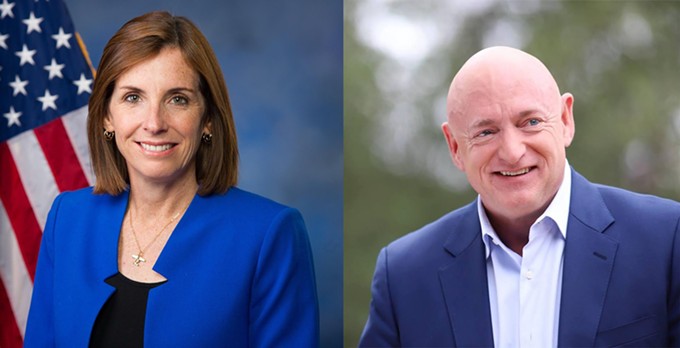Lord Help Her
Sen. Martha McSally calls for the divine intervention of negative advertising to save her as Democratic Mark Kelly continues to lead in polling and fundraising is it surprising that U.S.
Sen. Martha McSally is praying for help?
The Arizona Mirror reported last week that McSally told a crowd of Republicans that she needed independent campaign committees to start running TV ads to counter ongoing efforts to highlight her record on healthcare legislation.
"We need close air support to show up," McSally said, according to a recording of the meeting acquired by the Mirror. "There's outside groups. We can't talk to them. We can't invite them, but we pray for them every day. We need conservative outside groups, you know, to wake up, and get involved, and start muddying up the landscape a little bit, so I'm not just sitting here taking incoming and not having any A-10s show up, you know overhead, to help me out."
Team McSally is legally precluded from coordinating efforts with such groups, but it seems like she might be sending them secret signals nonetheless.
McSally's call for divine intervention comes as yet another poll shows Democratic challenger Mark Kelly holding a lead against her. McSally holds the distinction of being the first Republican to lose a U.S. Senate seat in Arizona in 30 years after she was defeated by Democrat Kyrsten Sinema in 2018. McSally was able to land in the U.S. Senate anyhow, having wired a backup plan with Gov. Doug Ducey to be appointed to the open U.S. Senate seat held by the late Sen. John McCain. But because she was appointed, McSally has to run for the seat this year—and while the race is shaping up to be one of the most competitive in the country, multiple polls have shown McSally trailing Kelly, the former Navy fighter pilot and retired NASA astronaut.
Kelly also happens to be the husband of former Southern Arizona congresswoman Gabby Giffords. Unsurprisingly, Team Kelly has some of the same key players who worked with both Giffords and the top aide who took her place in Congress, Ron Barber. And it was McSally who knocked Barber out of office back in 2014 by a mere 167 votes. So, Team Kelly is intimately familiar with McSally strengths and weaknesses—and given the history, this race is something of a grudge match.
The Public Policy Polling survey released last week showed Kelly with a 4 percentage point lead over McSally, with 46 percent of voters supporting Kelly and 42 percent supporting McSally. The survey of 760 Arizona voters, conducted Jan. 2-4, fits the pattern of similar polls released throughout 2019, with Kelly holding a narrow lead over McSally.
There's a lot of time between now and the November election and we wouldn't be surprised if this race remained too close to call even the morning after the election, as McSally's 2012, 2104 and 2018 elections were.
But McSally knows she's in trouble. Despite her reputation as a prodigious fundraiser during her years in Congress, she trailed Kelly in the dash for cash last year. This week, McSally said she had raised $4 million in the final quarter of 2019, bringing her total for the year to more than $12 million. That is respectable, but Team Kelly told the press this week that he'd raised $6.3 million in the same period, meaning he'd brought in more than $20 million in 2019. At the start of 2020, Kelly had $13.6 million in the bank, while McSally had $7.6 million, according to the campaigns.
And last week's PPP survey is just the latest to show McSally trailing Kelly. Part of the reason is that voters just haven't warmed up to her (or perhaps have cooled on her since she went from keeping her distance from President Donald Trump to embracing him). PPP's survey shows only 37 percent of voters approve of the job she is doing, while 47 percent disapprove; that lines up (on the approval level at least) with the trend line established in 2019 by ongoing Morning Consult polling, which showed McSally with an approval rating that varied from 35 percent to 40 percent. (Her disapproval rating in that survey ranged from 35 to 37 percent.) For comparison's sake, Morning Consult had Sinema, the Democrat who defeated McSally in 2018, with an approval rating of 47 percent and disapproval of 29 percent at the end of September—a net positive of 18 percentage points, compared to McSally's net positive of 2 percentage points.
Given the stakes—the Arizona Senate race could determine the balance of power in the U.S. Senate next year—McSally's prayers for third-party campaign support are likely to be answered later this year as this race breaks all previous spending records in the state.
God only knows whether all that money can save her from her own lousy voting record.













